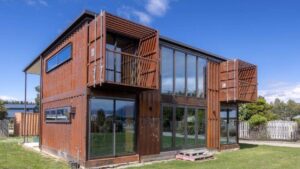Sustainable homes, also known as ecological or sustainable houses, are those homes designed and built with the aim of minimizing their environmental impact. These houses integrate ecological technologies and materials that reduce the consumption of natural resources, maximize energy efficiency, and promote environmentally responsible practices. For this reason, their design is focused on sustainability principles, such as efficient energy use, reducing carbon emissions, and harnessing renewable resources.
A key characteristic of these homes is their bioclimatic design, which takes advantage of natural elements such as sunlight, wind, and orientation to regulate internal temperature. This design helps reduce the need for artificial heating or cooling systems. Additionally, they often incorporate technologies like solar panels, rainwater harvesting systems, efficient thermal insulation, and low-energy consumption devices such as LED lights and high-energy class appliances to optimize and minimize energy usage.
However, this is not their only distinctive feature, but also the use of sustainable materials. For their construction, materials like certified wood, bamboo, recycled concrete, and paints without toxic compounds are used, chosen for their low environmental impact and durability. Likewise, sustainable homes also prioritize efficient waste management during construction and throughout their lifespan.

Benefits of Sustainable Homes
- Energy and Economic Savings: these homes are designed to consume less energy, significantly reducing utility bills. This is achieved through the use of solar panels, for example, which can generate a renewable energy source that decreases dependence on conventional sources.
- Reduced Environmental Impact: by using recycled materials and systems that optimize resource use, such as water and energy, these homes help reduce waste and greenhouse gas emissions.
- Improved Quality of Life: sustainable homes often have better thermal and acoustic comfort conditions, as well as being free of toxic materials, benefiting the health of their occupants.
- Market Value Appreciation: as the interest in sustainability grows, these homes tend to increase in value over time, attracting environmentally conscious buyers.
In summary, sustainable homes are an innovative and necessary response to current environmental challenges, as they offer tangible benefits for both their inhabitants and the planet.
Have you already checked out our YouTube channel? Subscribe now!

